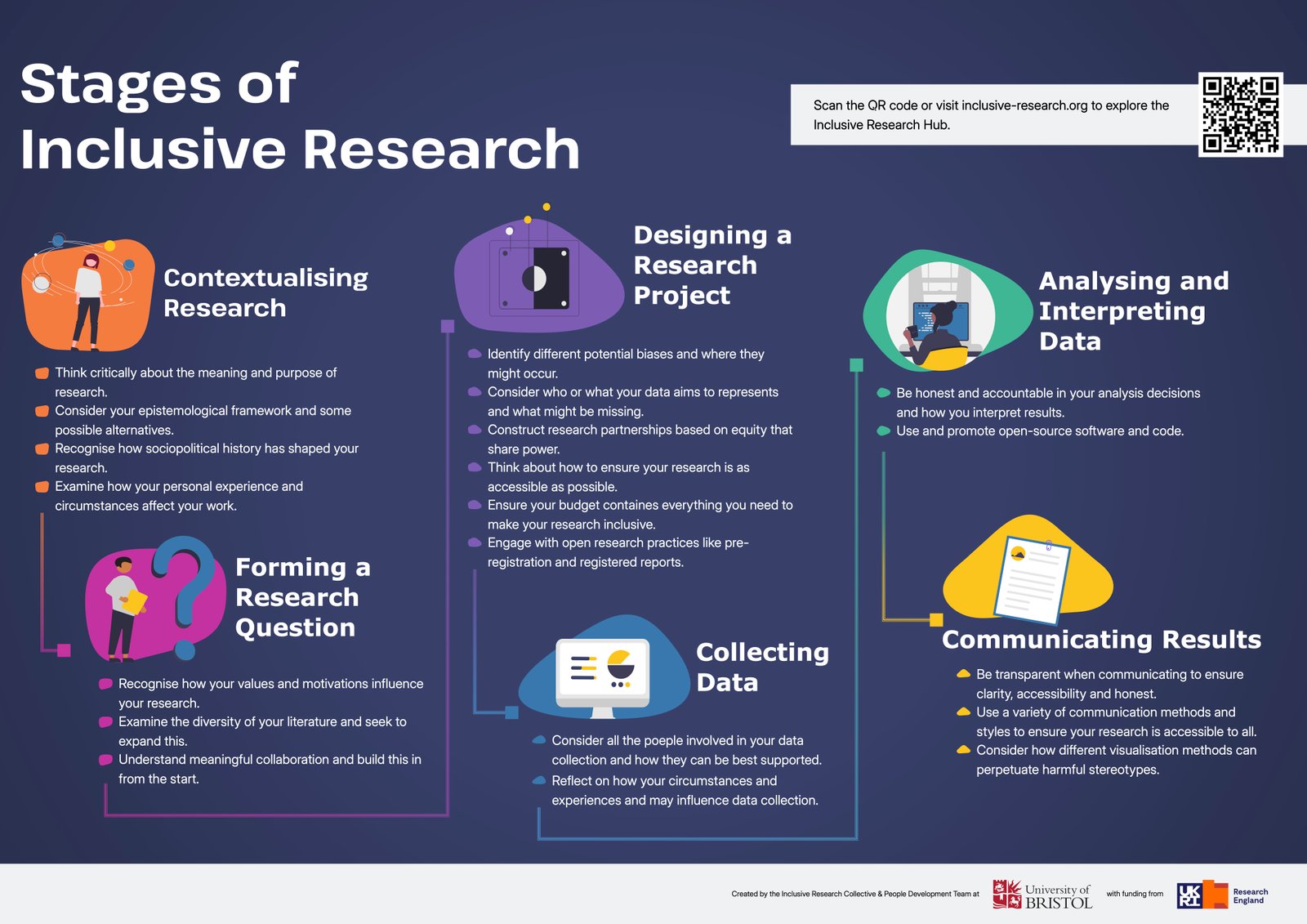Introduction
How it Works
Structure of the Hub
The Hub is organised into sections corresponding to each stage of the research process. These sections each contain several key topics related to inclusive research practice. You do not need to work through these stages consecutively and we would encourage you to engage with the toolkit in whichever way suits you best.
Using the workbook and poster
There is a workbook that accompanies the Hub which you can download here. The workbook follows the same structure as the Hub and provides space for writing down your own notes and reflections, as well as completing any activities we suggest. The workbook is a supporting resource; you will not miss anything if you do not use it but it may help you engage with the content.
There is also a poster which you can download here. Printing this out and having it in shared research space is useful to prompt engagement with other people and provide an overview of the components of inclusive research.
Engaging with the content
There is a lot of material here. Much of it is inspiring, but can also be provocative and challenging. We encourage you to take this seriously and give yourself proper space and time to use the Hub; build in opportunities to reflect, talk to others, find joy, and step away from these concepts when needed.


There is a moral imperative to do this work, there is also a moral imperative to look after yourself, both can coexist.
Depending on who you are and how you come to the Hub, the material within the toolkit can provoke a range of emotional responses including pain, anger, shame, defensiveness, denial and sadness. We encourage you to acknowledge these emotions, seek out the support you deserve in processing them, and interrogate why these feelings may have been evoked. For those of us who feel shame or defensiveness when confronted with things for which we may feel responsible, remember that these feelings often prevent us from having to truly engage with the work required to undo the situation.


Challenge these feelings and remember that just because we may benefit from injustice, and are therefore liable for costs of correcting it, this does not condemn us as individuals nor prevent us from being part of the solution.
Working together or as an individual
We would advise a mixture of individual and group engagement with the Hub. Getting an initial appreciation for the material can be easier by yourself, however to really develop your understanding and practice it is essential to work with others. Furthermore, given that not everyone is aware of or understands the importance of inclusive research, group engagement is an important way of bringing these issues to the surface of research culture. You could ask a colleague to discuss one of the topics using the prompts provided. You could start a discussion group or use a lab meeting to get others to engage in a topic with you, spending some time critically discussing the concepts and resources provided. Below we have provided some tips for these different forms of engagement.
- Don’t overload yourself. Engage with content in bite-size, digestible steps.
- Talk to others. Use the Hub to prompt discussion with those who may have different opinions or experiences to you.
- Remember that there are rarely quick fixes or easy answers. Be ambitious in your aim for change but compassionate in your approach.
Accessing publications
We have made an effort to refer to published work that is open-access, however this is not always possible. If you have difficulty accessing anything that we have suggested please get in touch to see if we can help.
Contributing
As you will come to see when working through the Hub, the steps to developing an inclusive research practice vary between researchers and research fields and are constantly evolving.
We want the Hub to be useful for researchers from different disciplines, however we are necessarily limited by our own knowledge and experiences. As such, inclusive research practice will be better developed through a collaborative and iterative process that can take on different perspectives and respond to new challenges.
The Hub is therefore a living resource, to which everyone can offer contributions as well as learn from. This version is one iteration of a resource that we hope will evolve over time. As you work through the Hub, please engage with it in a critical way. We welcome feedback and contributions of all kinds. Please use the box at the bottom of each page to leave your contribution.
